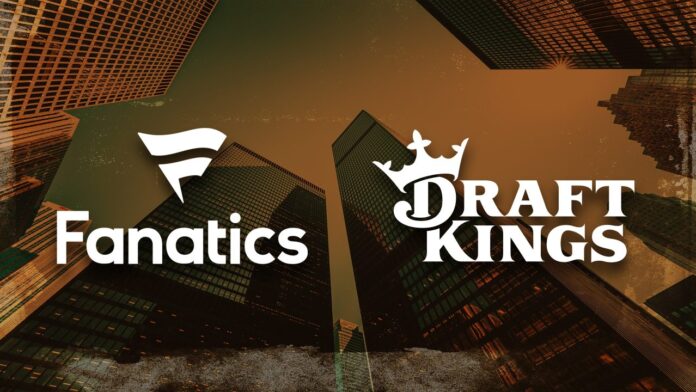DraftKings has sued a former senior vice president whom the company accused of being a “double agent” for coordinating with Fanatics to steal proprietary company information and join the competitor—all in violation of his noncompete.
The lawsuit comes days after Michael Hermalyn quit DraftKings and accepted a similar job at Fanatics overseeing VIP relationships for the nascent Fanatics betting operation. Hermalyn sued DraftKings last week, saying that his 12-month global noncompete was overly restrictive and unenforceable in California, where he said he is now living after relocating to work for Fanatics.
In its 49-page complaint, filed late Monday in the U.S. District Court for Massachusetts, DraftKings tells a different version of events. The company claims Hermalyn operated a “disloyal scheme” that began in early 2023, when he “clandestinely met” with Fanatics CEO Michael Rubin and discussed possible employment.
Hermalyn, who spent more than three years at DraftKings, allegedly flew to Los Angeles last month after telling DraftKings he would be in Pennsylvania to mourn the loss of a friend. While in LA, Hermalyn allegedly negotiated an employment contract with Fanatics and “downloaded DraftKings’ confidential business plans for the Super Bowl while sitting in Fanatics’ offices.” The lawsuit accuses Hermalyn of acting “in concert with Fanatics” and at one point refers to the events as Hermalyn and his new employer acting out “their scheme.”
A representative for DraftKings declined to comment. A lawyer for Hermalyn didn’t immediately respond to an email seeking comment.
“This is just sour grapes,” a Fanatics spokesman said in a statement. “DraftKings is understandably upset that one of its employees left for the greener pastures of Fanatics. The fact that they are trying to drum up ridiculous allegations on one of their well-respected executives in an attempt to ruin his reputation sheds some light on why employees may be choosing to leave that organization.”
Hermalyn filed a 26-page lawsuit against his former employer last week, claiming that the noncompete was overly restrictive and not enforceable in California, where he says he now lives. The noncompete, according to Hermalyn’s suit, spanned 12 months and prohibited Hermalyn from working in fantasy sports, betting and gaming anywhere in the world. It also prohibited him from soliciting former clients and co-workers from his time at DraftKings.
DraftKings says in its suit that the extensive nature of Hermalyn’s complaint “demonstrate[s] that Hermalyn had been coordinating with Fanatics and its lawyers for weeks—possibly months—to evade his non-competition obligations to DraftKings.”
It’s the latest public spat between the two billion-dollar sports businesses, which have just recently begun competing in areas like sports betting and NFTs. Last year, Fanatics’ proposed acquisition of PointsBet’s U.S. business was delayed after DraftKings submitted a non-binding offer that it claimed was better than that made by Fanatics. At the time, Rubin claimed the move was an attempt to “block” the deal. DraftKings never submitted a binding offer, and Fanatics ended up making the acquisition at a price 50% higher than its original offer.
For the past few years, Hermalyn led DraftKings’ VIP team, a role in which he oversaw the acquisition and retention of the company’s highest-value players. (He took a similar position at Fanatics.) In that role, the DraftKings suit says, he had access to “some of the company’s most valuable and sensitive trade secrets,” including the identities of the bettors, their preferences and DraftKings’ strategies for keeping their loyalty.
Hermalyn’s position also gave him access to employee lists as well as “compensation information” and “performance reviews and metrics” that could assist Fanatics in assessing its own employees and recruiting those at DraftKings, according to the suit. DraftKings says it took a bevy of steps to maintain the confidentiality of customer and employee records, giving the company a stronger argument they comprised trade secrets. According to DraftKings, Hermalyn contractually agreed to not compete with DraftKings or disclose sensitive information.
Even more brazenly, at least in DraftKings’ narrative, Hermalyn went so far as attempting to establish residency in California—which bars the enforceability of many noncompetes—for the purpose of invalidating his DraftKings noncompete. The company also says that an internal investigation uncovered allegations of workplace misconduct from female colleagues, and allegations that he misused a corporate credit card for personal gain.
The complaint contains nine counts including misappropriation of trade secrets, breach of a noncompete agreement and breach of duty of loyalty. These claims collectively insist Hermalyn agreed to a noncompete governed by Massachusetts law, which enforces noncompetes if they protect a legitimate business interest, and in doing so acted disloyally and harmed DraftKings by transferring trade secrets to an archrival.
DraftKings demands the court (as of this writing, no judge has been assigned) restrain Hermalyn from providing “any services” to Fanatics or its subsidiaries and affiliates related to research, sales, marketing and numerous other business activities found in the gaming industry. The restraining order would also bar Hermalyn from soliciting DraftKings’ customers, employees and others in possession of confidential information governed by the noncompete. DraftKings further seeks monetary damages reflecting the alleged harm Hermalyn inflicted on DraftKings.
Hermalyn will answer the complaint and seek its dismissal. Expect him to dispute DraftKings’ factual assertions and insist he acted lawfully and ethically. Hermalyn could argue he not only complied with his duties but that DraftKings is unlawfully trying to prevent him from joining a company that values him more. His lawsuit in California challenges the enforceability of the noncompete language as incompatible with that state’s law. Both sides of the two-state litigation are likely “forum-shopping” in that differences in California and Massachusetts laws on the enforceability of non-competes could impact the outcome.

